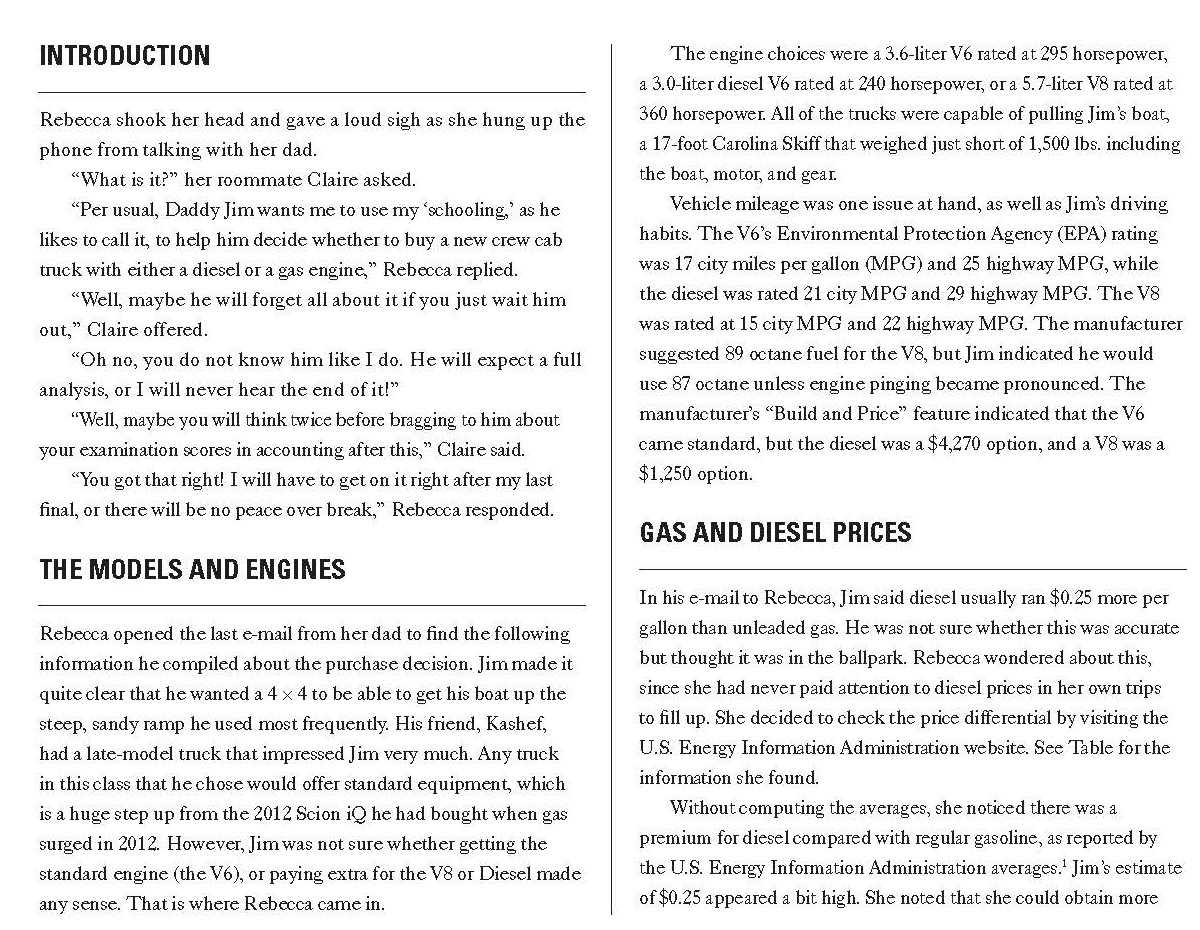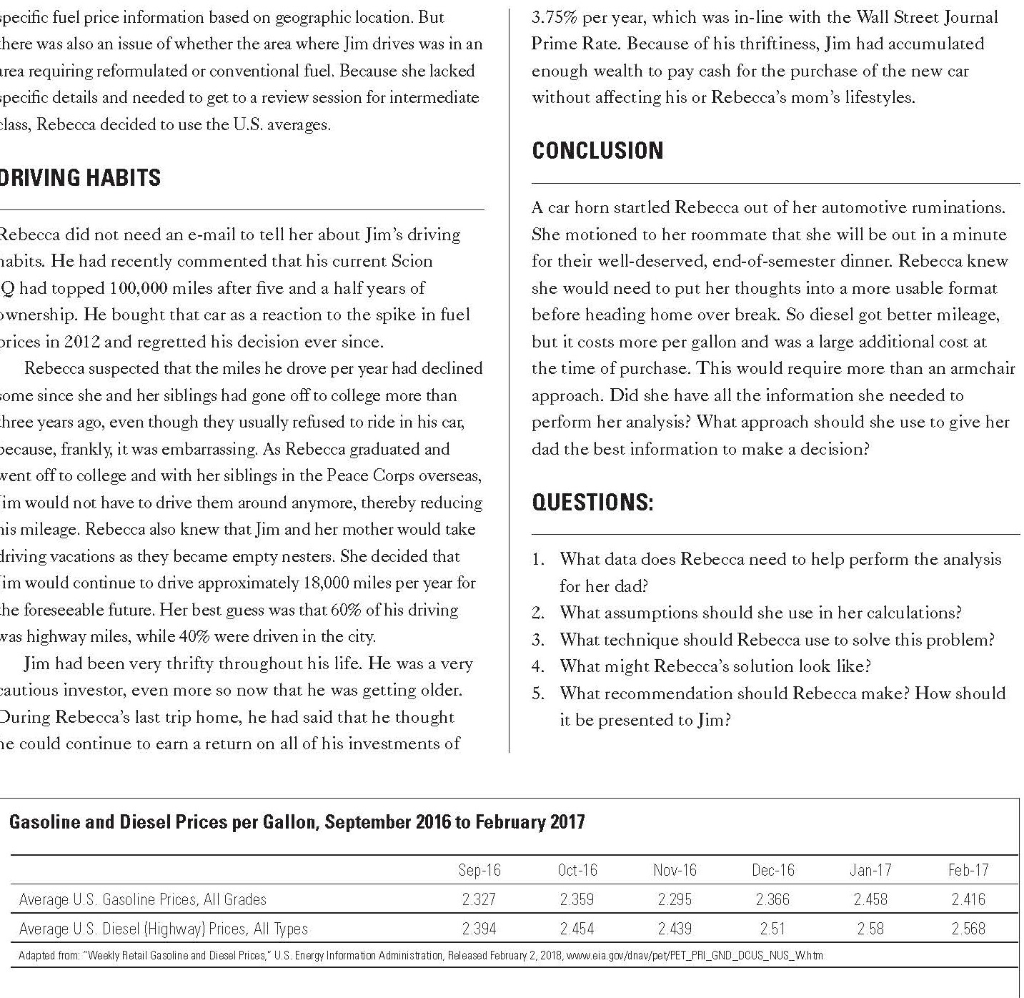1. What data does Rebecca need to help perform the analysis for her dad? 2. What assumptions should she use in her calculations? 3. What technique should Rebecca use to solve this problem? 4. What might Rebeccas solution look like? 5. What recommendation should Rebecca make? How should it be presented to Jim?


INTRODUCTION Rebecca shook her head and gave a loud sigh as she hung up the phone from talking with her dad. What is it?" her roommate Claire asked. "Per usual, Daddy Jim wants me to use my 'schooling,' as he likes to call it, to help him decide whether to buy a new crew cab truck with either a diesel or a gas engine," Rebecca replied. Well, maybe he will forget all about it if you just wait him out," Claire offered. "Oh no, you do not know him like I do. He will expect a full analysis, or I will never hear the end of it!" "Well, maybe you will think twice before bragging to him about your examination scores in accounting after this, " Claire said. You got that right! I will have to get on it right after my last final, or there will be no peace over break," Rebecca responded. The engine choices were a 3.6-liter V6 rated at 295 horsepower, a 3.0-liter diesel V6 rated at 240 horsepower, or a 5.7-liter V8 rated at 360 horsepower. All of the trucks were capable of pulling Jim's boats a 17-foot Carolina Skiff that weighed just short of 1,500 lbs. including the boat, motor, and gear. Vehicle mileage was one issue at hand, as well as Jim's driving habits. The V6's Environmental Protection Agency (EPA) rating was 17 city miles per gallon (MPG) and 25 highway MPG, while the diesel was rated 21 city MPG and 29 highway MPG. The V8 was rated at 15 city MPG and 22 highway MPG. The manufacturer suggested 89 octane fuel for the V8, but Jim indicated he would use 87 octane unless engine pinging became pronounced. The manufacturer's Build and Price feature indicated that the V6 came standard, but the diesel was a $4,270 option, and a V8 was a $1,250 option. GAS AND DIESEL PRICES THE MODELS AND ENGINES Rebecca opened the last e-mail from her dad to find the following information he compiled about the purchase decision. Jim made it quite clear that he wanted a 4 x 4 to be able to get his boat up the steep, sandy ramp he used most frequently. His friend, Kashef, had a late-model truck that impressed Jim very much. Any truck in this class that he chose would offer standard equipment, which is a huge step up from the 2012 Scion iQ he had bought when gas surged in 2012. However, Jim was not sure whether getting the standard engine (the V6), or paying extra for the V8 or Diesel made any sense. That is where Rebecca came in. In his e-mail to Rebecca, Jim said diesel usually ran $0.25 more per gallon than unleaded gas. He was not sure whether this was accurate but thought it was in the ballpark. Rebecca wondered about this, since she had never paid attention to diesel prices in her own trips to fill up. She decided to check the price differential by visiting the U.S. Energy Information Administration website. See Table forthe information she found. Without computing the averages, she noticed there was a premium for diesel compared with regular gasoline, as reported by the U.S. Energy Information Administration averages.' Jim's estimate of $0.25 appeared a bit high. She noted that she could obtain more pecific fuel price information based on geographic location. But here was also an issue of whether the area where Jim drives was in an area requiring reformulated or conventional fuel. Because she lacked pecific details and needed to get to a review session for intermediate class, Rebecca decided to use the U.S. averages. 3.75% per year, which was in-line with the Wall Street Journal Prime Rate. Because of his thriftiness, Jim had accumulated enough wealth to pay cash for the purchase of the new car without affecting his or Rebecca's mom's lifestyles. CONCLUSION DRIVING HABITS A car horn startled Rebecca out of her automotive ruminations. She motioned to her roommate that she will be out in a minute for their well-deserved, end-of-semester dinner. Rebecca knew she would need to put her thoughts into a more usable format before heading home over break. So diesel got better mileage, but it costs more per gallon and was a large additional cost at the time of purchase. This would require more than an armchair approach. Did she have all the information she needed to perform her analysis? What approach should she use to give her dad the best information to make a decision? Rebecca did not need an e-mail to tell her about Jim's driving habits. He had recently commented that his current Scion Q had topped 100,000 miles after five and a half years of wnership. He bought that car as a reaction to the spike in fuel prices in 2012 and regretted his decision ever since. Rebecca suspected that the miles he drove per year had declined ome since she and her siblings had gone off to college more than Chree years ago, even though they usually refused to ride in his car, Decause, frankly, it was embarrassing. As Rebecca graduated and went off to college and with her siblings in the Peace Corps overseas, im would not have to drive them around anymore, thereby reducing his mileage. Rebecca also knew that Jim and her mother would take driving vacations as they became empty nesters. She decided that im would continue to drive approximately 18,000 miles per year for he foreseeable future. Her best guess was that 60% of his driving was highway miles, while 40% were driven in the city. Jim had been very thrifty throughout his life. He was a very cautious investor, even more so now that he was getting older. During Rebecca's last trip home, he had said that he thought he could continue to earn a return on all of his investments of QUESTIONS: 1. What data does Rebecca need to help perform the analysis for her dad! 2. What assumptions should she use in her calculations? 3. What technique should Rebecca use to solve this problem? 4. What might Rebecca's solution look like? 5. What recommendation should Rebecca make? How should it be presented to Jim? Gasoline and Diesel Prices per Gallon, September 2016 to February 2017 Jan-17 Feb-17 2.458 Sep-16 Oct-16 Nov-16 Dec-16 Average US Gasoline Prices, All Grades 2327 2.359 2.295 2.366 Average US Diesel (Highway) Prices, All Types 2394 2.454 2.439 2.51 Adapted from: "Weekly Retail Gasoline and Diesel Prices, US Energy Information Administration, Released February 2, 2018, www.eia gov/dnav/pet/PET_PRI_GND_DCUS_NUS_Whtm 2.416 2.568 2.58 INTRODUCTION Rebecca shook her head and gave a loud sigh as she hung up the phone from talking with her dad. What is it?" her roommate Claire asked. "Per usual, Daddy Jim wants me to use my 'schooling,' as he likes to call it, to help him decide whether to buy a new crew cab truck with either a diesel or a gas engine," Rebecca replied. Well, maybe he will forget all about it if you just wait him out," Claire offered. "Oh no, you do not know him like I do. He will expect a full analysis, or I will never hear the end of it!" "Well, maybe you will think twice before bragging to him about your examination scores in accounting after this, " Claire said. You got that right! I will have to get on it right after my last final, or there will be no peace over break," Rebecca responded. The engine choices were a 3.6-liter V6 rated at 295 horsepower, a 3.0-liter diesel V6 rated at 240 horsepower, or a 5.7-liter V8 rated at 360 horsepower. All of the trucks were capable of pulling Jim's boats a 17-foot Carolina Skiff that weighed just short of 1,500 lbs. including the boat, motor, and gear. Vehicle mileage was one issue at hand, as well as Jim's driving habits. The V6's Environmental Protection Agency (EPA) rating was 17 city miles per gallon (MPG) and 25 highway MPG, while the diesel was rated 21 city MPG and 29 highway MPG. The V8 was rated at 15 city MPG and 22 highway MPG. The manufacturer suggested 89 octane fuel for the V8, but Jim indicated he would use 87 octane unless engine pinging became pronounced. The manufacturer's Build and Price feature indicated that the V6 came standard, but the diesel was a $4,270 option, and a V8 was a $1,250 option. GAS AND DIESEL PRICES THE MODELS AND ENGINES Rebecca opened the last e-mail from her dad to find the following information he compiled about the purchase decision. Jim made it quite clear that he wanted a 4 x 4 to be able to get his boat up the steep, sandy ramp he used most frequently. His friend, Kashef, had a late-model truck that impressed Jim very much. Any truck in this class that he chose would offer standard equipment, which is a huge step up from the 2012 Scion iQ he had bought when gas surged in 2012. However, Jim was not sure whether getting the standard engine (the V6), or paying extra for the V8 or Diesel made any sense. That is where Rebecca came in. In his e-mail to Rebecca, Jim said diesel usually ran $0.25 more per gallon than unleaded gas. He was not sure whether this was accurate but thought it was in the ballpark. Rebecca wondered about this, since she had never paid attention to diesel prices in her own trips to fill up. She decided to check the price differential by visiting the U.S. Energy Information Administration website. See Table forthe information she found. Without computing the averages, she noticed there was a premium for diesel compared with regular gasoline, as reported by the U.S. Energy Information Administration averages.' Jim's estimate of $0.25 appeared a bit high. She noted that she could obtain more pecific fuel price information based on geographic location. But here was also an issue of whether the area where Jim drives was in an area requiring reformulated or conventional fuel. Because she lacked pecific details and needed to get to a review session for intermediate class, Rebecca decided to use the U.S. averages. 3.75% per year, which was in-line with the Wall Street Journal Prime Rate. Because of his thriftiness, Jim had accumulated enough wealth to pay cash for the purchase of the new car without affecting his or Rebecca's mom's lifestyles. CONCLUSION DRIVING HABITS A car horn startled Rebecca out of her automotive ruminations. She motioned to her roommate that she will be out in a minute for their well-deserved, end-of-semester dinner. Rebecca knew she would need to put her thoughts into a more usable format before heading home over break. So diesel got better mileage, but it costs more per gallon and was a large additional cost at the time of purchase. This would require more than an armchair approach. Did she have all the information she needed to perform her analysis? What approach should she use to give her dad the best information to make a decision? Rebecca did not need an e-mail to tell her about Jim's driving habits. He had recently commented that his current Scion Q had topped 100,000 miles after five and a half years of wnership. He bought that car as a reaction to the spike in fuel prices in 2012 and regretted his decision ever since. Rebecca suspected that the miles he drove per year had declined ome since she and her siblings had gone off to college more than Chree years ago, even though they usually refused to ride in his car, Decause, frankly, it was embarrassing. As Rebecca graduated and went off to college and with her siblings in the Peace Corps overseas, im would not have to drive them around anymore, thereby reducing his mileage. Rebecca also knew that Jim and her mother would take driving vacations as they became empty nesters. She decided that im would continue to drive approximately 18,000 miles per year for he foreseeable future. Her best guess was that 60% of his driving was highway miles, while 40% were driven in the city. Jim had been very thrifty throughout his life. He was a very cautious investor, even more so now that he was getting older. During Rebecca's last trip home, he had said that he thought he could continue to earn a return on all of his investments of QUESTIONS: 1. What data does Rebecca need to help perform the analysis for her dad! 2. What assumptions should she use in her calculations? 3. What technique should Rebecca use to solve this problem? 4. What might Rebecca's solution look like? 5. What recommendation should Rebecca make? How should it be presented to Jim? Gasoline and Diesel Prices per Gallon, September 2016 to February 2017 Jan-17 Feb-17 2.458 Sep-16 Oct-16 Nov-16 Dec-16 Average US Gasoline Prices, All Grades 2327 2.359 2.295 2.366 Average US Diesel (Highway) Prices, All Types 2394 2.454 2.439 2.51 Adapted from: "Weekly Retail Gasoline and Diesel Prices, US Energy Information Administration, Released February 2, 2018, www.eia gov/dnav/pet/PET_PRI_GND_DCUS_NUS_Whtm 2.416 2.568 2.58








